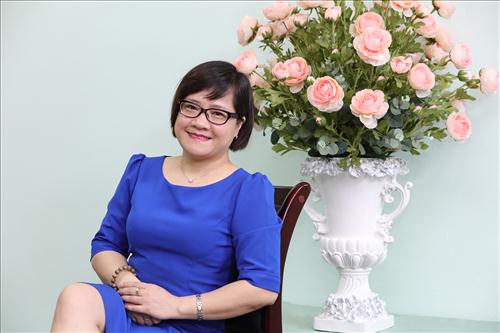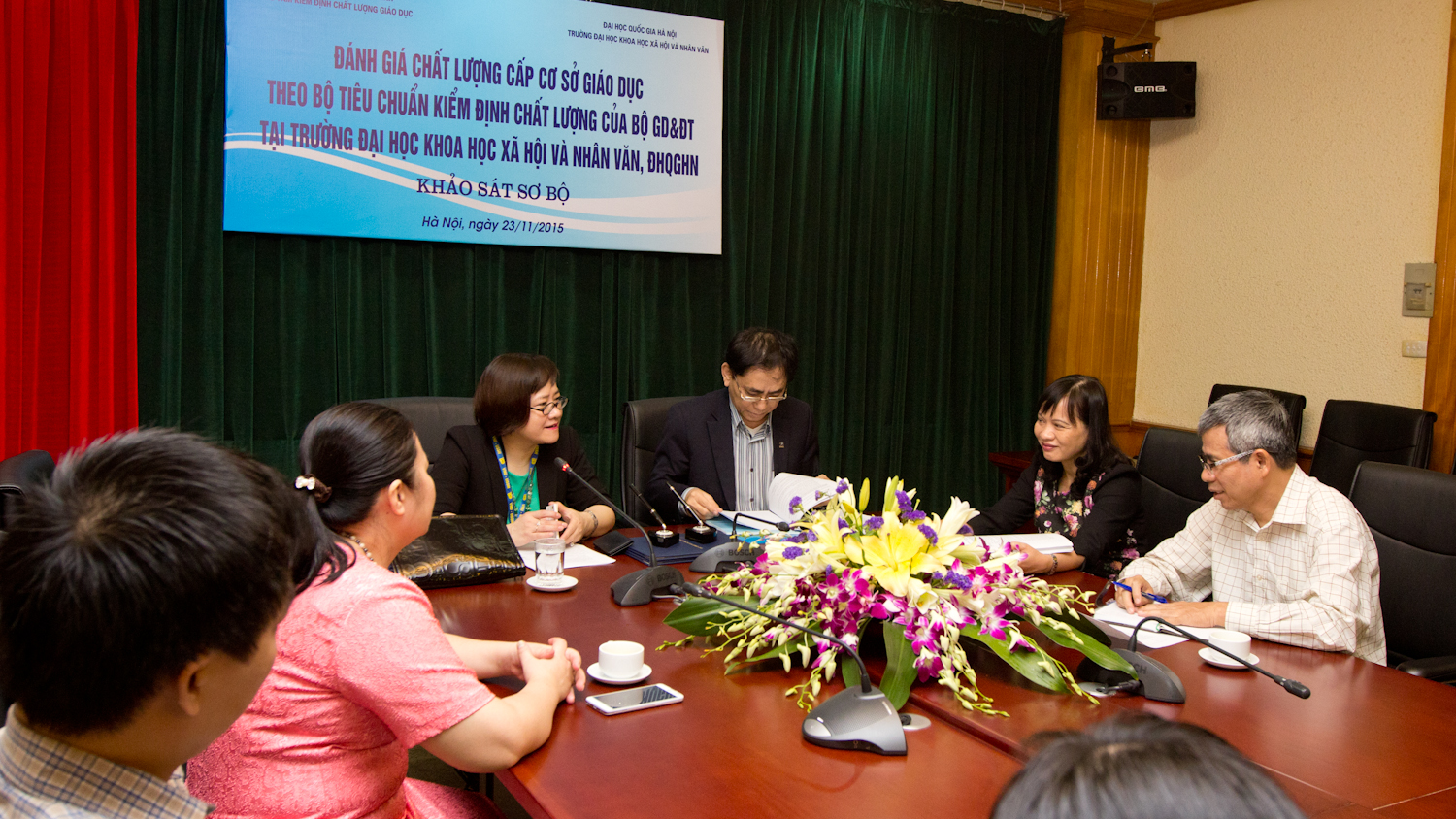
Related articles:
Some notable results regarding the school's quality assurance activities.

Associate Professor Dr. Tran Thi Minh Hoa, Vice Rector of the University, is in charge of finance, administration, facilities management, and quality assurance.
1. The biggest difficulty is the issue of awareness.
- Professor Tran Thi Minh Hoa, what objective and subjective factors have driven the university's training quality accreditation activities since their inception?
The university's inclusion of a quality accreditation program in its overall development strategy stems from two factors: firstly, the external context and general international and domestic trends; and secondly, the university's own internal requirements. Globally, in developed countries, high-quality training programs and universities must be accredited and recognized through prestigious rankings. In Vietnam, the Ministry of Education and Training has recognized the role and is increasingly emphasizing the importance of accreditation in improving the quality of education at universities.
In fact, when universities in Vietnam first began implementing quality accreditation, many people did not yet understand the deepest purposes of quality accreditation, which are...To ensure and improve the quality of training within an educational institution.That is the most important thing. The key to development is continuously improving quality. Rapid, short-sighted, and opportunistic development approaches are unsuitable in this era. Anything lacking quality, or failing to maintain and improve it, will be rejected by society. The University of Social Sciences and Humanities, VNU Hanoi, is a center of training and scientific research with a rich tradition. We must preserve and promote our prestige, reputation, traditions, and achievements left by previous generations by continuously improving the quality of the University's activities.
- What are the biggest challenges in implementing training quality assurance activities?
Awareness – that's the first and most important challenge. From the school's leadership, functional departments, specialized faculties, to every staff member, employee, and student… if they don't have a correct and complete understanding of the importance of accreditation, they won't be able to implement this activity effectively. Initially, many questions and concerns were raised, such as: What's the point of accreditation? Why do we need accreditation when things are already good? Is accreditation just a formality, following a trend…?
From a direct perspective, accreditation is about reviewing and evaluating where we stand, what our strengths are, what weaknesses exist, and what plans and solutions are needed to address them. Without accreditation, we cannot guarantee the standards required for recognition in regional and global university rankings.
Each training program applying for accreditation will be thoroughly reviewed by the university and faculty. Any criteria that are lacking, need adjustment, or require investment will be addressed. Accreditation at the institutional level (university level) requires even more attention. We need to define our current standards and determine what needs to be done to improve.
Returning to the issue of perception, if we only consider testing as a formality, we will only do it to get it over with, as a formality, and in doing so, we will be setting ourselves back.
- How has the accreditation of training programs impacted the school's operations?
The accreditation and quality assurance process is the culmination of all the resources of the university. Accrediting a training program doesn't just involve the faculty implementing the program; it requires the participation of an entire system: from the university leadership, functional departments, and collaborating units; encompassing aspects from training, scientific research, student affairs, to finance and facilities…
The training program was reviewed, not to check "what to teach?", but more importantly, "how to teach?". Teaching methods were therefore reformed. Many students in various departments had excellent foreign language skills, but when interviewed in a foreign language by the evaluation team, they were unable to communicate. This is an example of the ingrained approach to foreign language teaching in Vietnam, which focuses solely on grammar, reading comprehension, and writing.
Archiving has been a long-standing limitation, from the university level down to the faculty level. When preparing accreditation dossiers, supporting documents are crucial. This has significantly impacted archiving activities. Therefore, the entire archiving operation of the university and its faculties must be adjusted to be more rigorous and scientific.
In particular, conducting interviews with various stakeholders—students, alumni, employers, etc.—allows the university to receive objective assessments and practical feedback from society. Without listening to and responding to society's development needs, we cannot integrate into that overall development. From a university with a rich tradition in basic sciences, we have expanded into applied sciences. Even in the field of scientific research, despite the university's many achievements, we still need to further develop and promote key research projects and policy consulting activities, contributing more to the summarization and policy advice for local and national development, etc.
Furthermore, the University must conduct a comprehensive review and assessment of its infrastructure, equipment, and training support services: from offices and lecture halls to utilities, machinery and equipment for training and scientific research, and the surrounding environment, in order to invest in and improve quality. Some conditions, such as floor space and infrastructure, cannot be changed. However, what we need to do well is to use resources efficiently, safely, economically, and responsibly, while maintaining a positive working environment and landscape. Workplace culture is emphasized to ensure that the University of Social Sciences and Humanities always upholds its identity and traditions, while remaining a dynamic, professional, and integrated environment for work, study, and research.
In short, after the evaluation process, there are indeed many areas that we have had to and will continue to reform and adjust to improve quality.

Preliminary survey session of the quality assessment of educational institutions according to the quality accreditation standards of the Ministry of Education and Training at the University of Social Sciences and Humanities in 2015.
2. Post-audit is a measure of progress.
ButLet's talk about the scores from quality assurance audits. Is it possible that scores are also a factor that makes many organizations hesitant to undergo audits?
It's true that there's a fear of grades: What if I get a low score on the accreditation? Why do some programs have low scores while others have high scores? Why do some schools have low scores while others have high scores?...
No, the issue isn't the score. That's not the goal we need to achieve. Our goal is to assess our current situation and identify areas for improvement. Only by participating in accreditation and familiarizing ourselves with the established standards can we truly see our current standing. Furthermore, it's crucial to clearly distinguish between the various standards currently applied in accreditation (domestic accreditation includes the standards of Vietnam National University, Hanoi and the Ministry of Education and Training; international accreditation includes the AUN – ASEAN University Network standards); differentiate between the university's program classification systems (standard, high-quality, strategic-level, and international-standard programs); and consider the correlation between social sciences and humanities and natural sciences… to understand that comparing scores is only relative. For example, under the same AUN accreditation standards, the standard program of the Faculty of Oriental Studies was rated 4.3/7 points, but this cannot be compared to the 4.57/7 score of the Faculty of Linguistics (a strategic mission program - of international standard, which has received significant investment).
In 2015, the University of Social Sciences and Humanities, along with many other universities in the Vietnam National University system, conducted an assessment of its training facilities according to the standards set by the Ministry of Education and Training. Our university achieved 56 out of 61 criteria, which was considered the best result compared to other universities in that assessment. This figure also acknowledges the university's efforts over the past period. At the same time, we must also acknowledge the criteria that we have yet to meet.
So what will happen after the inspection?
Accreditation is not just about "diagnosing" what ailments we have; more importantly, it's about developing plans, solutions, and implementing measures to "cure" those ailments. That's why I often say that while accreditation is necessary, post-accreditation is even more crucial. School-level accreditation should be conducted every five years, including an initial assessment and a mid-term review to assess improvements, innovations, and corrective actions. Currently, we've only focused on accreditation itself and haven't given sufficient attention to post-accreditation. Post-accreditation also requires resources and cannot be easily implemented.
- What plan will the school implement in the next phase of its quality accreditation process?
Quality assurance is a continuous, long-term, and sustainable process. Accreditation activities need to be regular and substantive. The entire system, from the university level down to individual units, must prioritize and proactively conduct SELF-ASSESSMENT, in addition to assessments by other accreditation teams. According to the plan of Vietnam National University, Hanoi, by 2020, all undergraduate programs must be accredited, with one-third of them accredited according to AUN standards. Therefore, the University of Social Sciences and Humanities needs to accredit 24 undergraduate programs, including 8 programs according to AUN standards. If we do not actively implement this, we will not be able to ensure the progress.
Training programs need to be accredited according to domestic standards before applying for accreditation under AUN standards. Since the budget only partially supports the accreditation process, the University must balance its resources to create conditions for a long-term and sustainable implementation plan. Therefore, the accreditation of training programs must be spread evenly over the years from now until 2020. In recent times, the University's Center for Quality Assurance in Education has been very active, implementing accreditation activities in an increasingly professional manner. Functional departments and faculties have become familiar with accreditation work, and a proactive spirit has been fostered. It can be said that the current work is much smoother, faster, and more efficient.
- Professor Tran Thi Minh Hoa, you began your tenure as Vice Rector of the University in 2012, in charge of finance, administration, and facilities management. From 2014, you were also assigned to oversee quality assurance. After two years of involvement in this area, what are your impressions?
Initially, I thought this would be a difficult and challenging task for me. I would have to dedicate a lot more time and effort to this additional area of work. Fortunately, during my time as Head of the Faculty of Tourism Studies (2010-2012), I directly organized and participated in the accreditation of the Faculty's training programs, so I had some experience. However, managing at the university level is very different from managing at the faculty level. With the motto "if you don't know or don't understand, you must learn," I directly participated in many training sessions. When you do something, you have to be wholeheartedly committed, clear, and coherent. I am pleased that, to date, the tangible results from the quality accreditation work have created a significant change in the awareness and actions of the entire university. Many faculties are ready to register for accreditation in the near future. Looking ahead, I also have confidence. Confidence that we will not only ensure the accreditation process, but more importantly, that we will achieve innovation. The crucial question is: Do we have the determination? The conditions for success are: "Correct understanding – High determination – Feasible plan – Effective implementation".
We sincerely thank Associate Professor Dr. Tran Thi Minh Hoa for sharing.
Author:Thu Ha wrote
Newer news
Older news